Navigating the complexities of Dementia Law in relation to Power of Attorney can seem like navigating through a maze where crucial decisions come up at every corner. It is essential to comprehend the legal consequences and duties associated with this procedure to protect the welfare of individuals affected by dementia.
As we delve into this topic, we will explore the nuanced considerations and practical steps necessary to ensure the protection and dignity of our loved ones facing cognitive challenges.
Understanding Power of Attorney Basics
When considering the complexities of managing legal and medical decisions for a person with dementia, understanding the basics of a power of attorney becomes paramount. A power of attorney is a legal document that grants someone the authority to make decisions on behalf of another individual, particularly in medical and legal matters. For individuals with dementia, a durable power of attorney is often recommended. This type of power of attorney remains valid even if the person becomes incapacitated, ensuring continuity in decision-making.
There are different types of powers of attorney, including immediate and springing power of attorney. Immediate power of attorney becomes effective as soon as it's executed, while springing power of attorney only becomes active under specific conditions, such as the person becoming incapacitated. Understanding these distinctions is crucial for managing decisions effectively and ensuring that the appointed agent acts in the best interest of the person with dementia. Regular updates and clear communication with family members and healthcare providers are essential for the successful navigation of a power of attorney in dementia care.
Legal Considerations for Dementia Care

In navigating legal considerations for dementia care, establishing a power of attorney is a crucial step to effectively manage financial and healthcare decisions for our loved ones. This legal tool allows a designated agent to act on behalf of a person with dementia when they're no longer able to make decisions independently. By setting up a power of attorney early, we can protect our loved one's interests and ensure their wishes are respected without the need for guardianship or conservatorship in case of incapacity.
Understanding the responsibilities that come with power of attorney is essential for caregivers and families of individuals with dementia. Here are some key points to consider:
- Power of attorney enables decision-making for financial and healthcare matters.
- It helps uphold the wishes and best interests of the person with dementia.
- Early establishment can prevent the need for guardianship or conservatorship.
- Caregivers must understand their legal obligations and duties under a power of attorney.
- Seeking legal advice can clarify any uncertainties and ensure proper execution of the document.
Decision-Making in Incapacity Situations
Establishing a Power of Attorney for individuals with dementia is a vital step in ensuring seamless decision-making during situations of incapacity. When a person with dementia becomes incapacitated, the appointed agent named in the Power of Attorney document gains the authority to make crucial decisions on their behalf. This includes decisions related to both medical care and financial matters, providing a sense of continuity in managing the individual's affairs.
To ensure that the agent's decisions align with the individual's preferences, specific guidelines and limitations can be outlined in the Power of Attorney document. It's highly recommended to put this legal arrangement in place early on to prepare for potential incapacity situations effectively and in compliance with the law.
Navigating Power of Attorney Laws

How can one effectively navigate the intricate landscape of Power of Attorney laws, particularly in situations involving individuals with dementia? Understanding the legal intricacies surrounding power of attorney for individuals with dementia is crucial. Here are some key points to consider:
- State Variations: Power of attorney laws vary by state, so it's essential to be well-versed in the specific regulations of your location.
- Mental Capacity: Ensuring that the individual has the mental capacity to assign an agent is a fundamental requirement in navigating power of attorney laws for dementia cases.
- Documentation: Legal requirements for power of attorney mandate proper documentation, including written, witnessed, and notarized forms.
- Legal Expertise: Consulting with an attorney experienced in elder law can provide invaluable guidance in navigating the complexities of power of attorney laws for individuals with dementia.
- Activation Options: Understanding the activation options, such as immediate or springing, is vital to align the power of attorney with the individual's needs and preferences.
Incorporating these considerations can help navigate the challenging terrain of power of attorney laws for individuals with dementia effectively.
Tips for Implementing Power of Attorney
To effectively implement a Power of Attorney, it is essential to ensure that the document is meticulously detailed, signed by a notary, and potentially witnessed for legal validity. It's prudent to split responsibilities into financial and medical decisions to manage them effectively under the Power of Attorney. Regularly reviewing and updating the document is crucial as the individual's condition and circumstances evolve. Consulting with an attorney well-versed in elder law can help craft a comprehensive Power of Attorney document tailored to specific needs. Open communication with family members and healthcare providers is key to ensuring clarity and garnering support for the arrangements in place. Here is a helpful table summarizing key tips for implementing a Power of Attorney effectively:
| Tips for Implementing Power of Attorney |
|---|
| Ensure detailed legal document |
| Split duties for financial and medical decisions |
| Regularly review and update the document |
Implementing a Power of Attorney is a critical component of estate planning, particularly in cases involving dementia or mental health challenges. By following these tips, individuals can navigate this process with greater ease and assurance.
Frequently Asked Questions
What Three Decisions Cannot Be Made by a Legal Power of Attorney?
We can't make decisions about end-of-life care, personal matters like marriage, or changing wills for the principal.
Our role doesn't extend to personal relationships, illegal activities, or actions against the law.
It's crucial to remember the limitations in place to honor the principal's wishes and protect their interests.
Adhering to these boundaries ensures we act ethically and serve the principal's best interests at all times.
Can a Person With Dementia Change Power of Attorney?
Yes, we should consider the individual's mental capacity before allowing them to change their Power of Attorney.
It's essential to assess their ability to understand and make decisions.
If a person with dementia is deemed incapacitated and incapable of making informed choices, they may not have the legal capacity to alter their Power of Attorney.
Legal guidance and mental capacity evaluation are crucial in this process to ensure the individual's best interests are protected.
Does a Person With Dementia Have Legal Capacity?
We understand the importance of determining if a person with dementia has legal capacity.
It involves assessing their ability to comprehend documents, understand consequences, and communicate preferences.
This evaluation is crucial before signing documents like a power of attorney, ensuring validity and honoring the individual's wishes.
What Are 3 Things to Never Do With Your Loved One With Dementia?
When caring for a loved one with dementia, we must remember to avoid correcting them, asking complex questions, and rushing them. These actions can lead to frustration, confusion, and increased stress for our loved ones.
Instead, we should strive to be patient, understanding, and supportive, providing a comforting environment that nurtures their well-being and preserves their dignity. It's essential to approach each interaction with empathy and kindness.
Conclusion
In the intricate dance of dementia care, the Power of Attorney is our trusted partner, guiding us through the twists and turns of decision-making. Like a compass in a stormy sea, it provides clarity and direction, ensuring the well-being and dignity of our loved ones.
With proper legal guidance and early preparation, we can navigate the challenges ahead with confidence and compassion. Trust in the Power of Attorney to protect and advocate for those who need it most.









